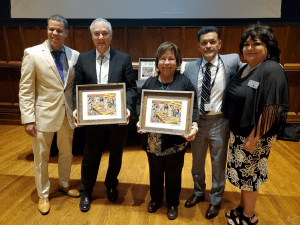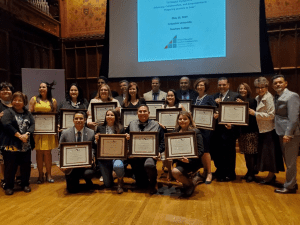If we want to help a student, we should help a teacher. If we want to help a teacher, we should help school and district leaders.

ACT honored for supporting the ALAS Superintendents Leadership Academy (SLA) since its inception in 2011. L-R: Alex Marrero, Asst. Superintendent, East Rampo Central School District (NY); Jim Larimore and Maria Vasquez, ACT Center for Equity in Learning; Dr. Jose Leyba, SLA faculty director; Dr. Nancy Lewin, Executive Director of ALAS
What will it take to create impact, at scale, to improve education for underserved learners? Technology and innovation can help. But as we seek to improve learning, it is clear that we need to focus as much—or more—attention on the people whose work creates positive learning environments and transformative learning experiences.
Let us introduce you to an organization that is doing an amazing job of preparing the next generation of education leaders that serve historically underserved student populations. They are transforming learning environments to create more equitable learning opportunities that will better serve all of America’s children.
Technology is a tool that has the potential to improve learning and close gaps in equity and student achievement. However, for that potential to become a reality, we need to identify and support teachers and education leaders who can do what only humans can do:
- see their students as whole people,
- understand the strengths that support their growth, as well as the challenges and obstacles that can block their way,
- love them as young learners who possess dignity and deserve respect,
- provide the challenges and support that students need to help them realize their dreams, and
- address learning disparities that block access to high quality curriculum and opportunities for learning and personal growth.
We are both first-generation college graduates who became educators: Maria in the K-12 sector and Jim in the postsecondary sector. We recently had the honor and privilege to travel to New York City to participate in the graduation ceremony for Cohort VIII of the Superintendents Leadership Academy (SLA), which is organized by the Association of Latino Administrators and Superintendents (ALAS). ALAS is a national association of education leaders serving school districts with at least 20% Latino student population.
The ALAS organization now has 17 network state affiliates that include California, Oregon, Nevada, New Mexico, Arizona, Colorado, Utah, Texas, Illinois, New York, Pennsylvania, Florida, Georgia, Tennessee, Connecticut, Massachusetts and the Nation’s Capitol region: DC, Maryland and Virginia.
ACT partnered with ALAS eight years ago to create the SLA, and we remain closely involved in the evolution of the SLA, which is a year-long professional development experience for aspiring LatinX education leaders. Led by an experienced Latino superintendent, the SLA is an intensive and intimate learning experience that accelerates personal and professional growth, and it is producing amazing results:
- In eight years, the SLA has graduated 122 aspiring school and district leaders.
- More than half of the graduates are now superintendents, associate superintendents, or executives of national organizations.
- More than one-third are Central Office leaders and administrators.
- One serves as a Principal.

The “Great 8”a.k.a Cohort 8 of the ALAS SLA with their certificates of completion
In less than a decade, SLA has become an important driver in the national effort to increase the diversity of school and district leaders.
But here is another way to think about scale. SLA graduates lead schools and districts with nearly 475,000 teachers … in nearly 9,700 schools … reaching about eight million students. That’s pretty impressive for the first eight years, and demonstrates the quality of the ALAS and SLA leadership, and the talent of SLA participants and graduates.
ACT and ACT’s Center for Equity in Learning are proud of our ALAS colleagues and SLA alumni, for who they are as human beings, and for their dedication to our students, communities, and the nation. Leadership matters, and this leadership program is becoming a national treasure.
